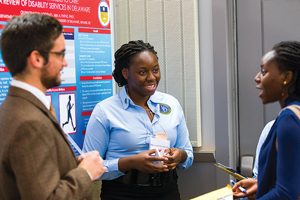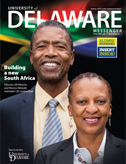National McNair Scholars present research at UD

ON THE GREEN | Joseph V. Kerridge really likes chemistry. It’s wired into him, just like his career goal to become a university professor.
Last fall, Kerridge, a junior McNair Scholar majoring in chemical engineering at UD, had the opportunity to do what many university professors do. He presented a scientific poster highlighting his research, on bacteria that degrade asphalt.
The venue was the National McNair Scholars Research Competition and Graduate Fair, an event that UD’s McNair Scholars Program—one of 158 such programs nationwide—has hosted for the past 11 years.
More than 80 percent of the University’s McNair Scholars enroll in graduate school immediately after bachelor’s degree attainment, continuing their studies all the way through the doctoral degree. The participants are either first-generation college students with financial need or members of a group that traditionally has been underrepresented in graduate education; all have demonstrated strong academic potential.
“Our goal is to transform talented students into scholars of excellence by involving them in research and other scholarly activities in preparation for doctoral degree attainment,” says Kim Saunders, director of UD’s McNair Scholars Program. “We provide this event annually as a community service for our scholars and other college students, as well as area residents interested in graduate school.”
More than 350 people attended the 2013 event, which included seminars on graduate admissions and a graduate school fair featuring 83 graduate programs at universities from California to Delaware to the United Kingdom.
But the highlight for Kerridge and his co-presenters was the research poster competition. He collected bacterial samples from roads around Newark, Del., and then analyzed them to determine what microorganisms were present and to monitor their growth under various conditions.
“The ultimate goal is to figure out how to modify the bacteria to have them fix the asphalt instead of degrade it,” Kerridge says.






